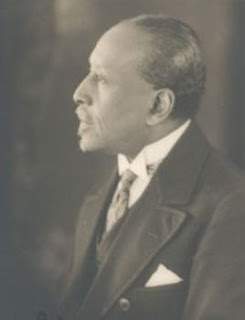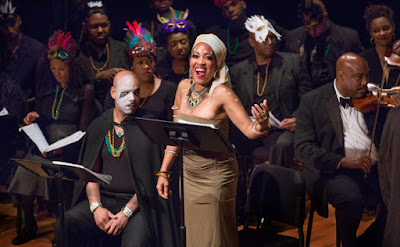Elizabeth – A most unlikely concert performance at a most appropriate time, Voodoo, a Harlem Renaissance opera by African-American Harry Lawrence Freeman last performed in 1928 was performed this past Friday and Saturday at Columbia University’s Miller Theatre in Morningside Heights. The concert was the result of the discovery by one student, Annie Holt, of Freeman’s handwritten scores while working at Columbia’s library as she studied for a PhD in theater. As she worked towards producing Voodoo, many others joined forces including Morningside Opera (which Holt helped found), Harlem Opera Theater and The Harlem Chamber Players. The background on how the production came to life is fascinating as it went from handwritten scores to iPads.
 |
| Harry Lawrence Freeman |
Both nights were sold out and on Saturday the semi-staged performance started late as rain delayed the crowds scrambling for seats. The audience patiently waited as the orchestra onstage warmed up while pictures of Harry Lawrence Freeman and his family were projected onto a screen above. Photos of a serious and well-dressed man shed little light on this mysterious composer, the first African American to write an opera that was successfully produced, friend of Scott Joplin, founder of several opera companies and composer of at least twenty three operas, many never performed.
It was clear when the performance was going to start: out strode conductor Gregory Hopkins in a black sequined sparkling jacket. After that jolt of energy and enthusiasm came the music: a surprising mix of jazz, spiritual, and distinctly American sounding music. I could hear echoes of Scott Joplin and big band sounds. The spiritual music of the first two acts also reminded me of elements of Carlisle Floyd’s Susannah. The music was wonderfully textured with typical orchestra fare along with a banjo that took on an increasingly larger role as well as a harp and xylophone. It was quite a mélange.
The opera takes place leading up to the festival of St John’s Eve, the birth of St John, celebrated the evening of June 23. Celebrated around the world in various ways (jumping over fire, hanging St. John’s wort to ward away evil spirits), in the United States St. John’s Eve was mostly practiced in Louisiana Voodoo, where this opera takes place. The time is shortly after the civil war on a plantation in Louisiana. Two plantation workers, Cleota and Lolo, are out one evening when Cleota’s love, Mando, buys her a protective amulet. Jealous, Lolo snatches it away from Cleota and destroys it. Despite having her own suitor, Lolo is focused on Mando and her jealousy leads her to a voodoo ritual deep in the forest where she casts spells on Cleota hoping to kill her.
 |
| Janinah Burnett |
Janinah Burnett as Lolo was amazing and the highlight of the evening. I saw a reference to the Metropolitan Opera in her bio and wondered why I haven’t seen her before. Her voice was powerful and evocative. Steve Wallace was generally strong as Mando, though the top notes in the score seemed strenuous for him. JoAnna Marie Ford had a delicate sweetness about her as Cleota, I thought she was lovely. The orchestra and supporting singers all poured much passion and love into the production, and it was clear the audience wanted to love it. Unfortunately it was difficult to understand at times. The production could have used super titles, even though it was sung in English, as it was hard to discern what the singers were saying aside from Janinah Burnett. That to me was the biggest disappointment of the evening. I had the plot synopsis but could not understand most of the singers so I was unable to fully follow the action. A rookie mistake perhaps, and one they hopefully will not make in their next production and the next time one of Freeman’s operas is produced.
Shawn – I wrote in great detail the backstory and fascinating process of bringing this opera, nearly lost to history, to the stage HERE.
In seeing it finally at Columbia University’s Miller Theatre on Saturday night, my reaction was mixed. The were moments when I was completely swept up in the music. Particularly the choral voodoo ritual that opens act three. At other times however, particularly halfway through the second act, I found my mind wandering.
 |
| Janinah Burnett (NYT image) |
This could be in part because of the strength of soloist Janinah Burnett. She was so strong I was at times literally brought to the edge of my seat by her emotional intensity. She was able to bring a specificity and poignant core to what was otherwise a somewhat broadly drawn role. But when she wasn’t center stage the show sagged.
Additionally, supertitles would have helped immensely as Burnett was the only soloist whom I could fully understand what she was singing. And the narration by WQXR’s Terrance McKnight, while perfectly competent and delivered with great enthusiasm and drama, did not particularly enhance my ability to follow the narrative.
And at the penultimate moment of act three, actually interfered with the drama. After Burnetts’s surprisingly effective final lines of “Voodoo, Voodoo, Voodoo” in which she casts a final death spell on her romantic rival, which Burnett delivered with an almost terrifying softness and eroticism, and is then shot to death – McKnight read aloud the stage directions that she is shot after we have already heard the audial gunshot from the percussion. It was very disruptive to the spell Burnett cast through her sheer vocal and dramatic dynamism.
 I had not heard of Ms. Burnett before this performance though she seems to have had some great successes, singing at the Met and elsewhere, but I will be on the watch for her appearances from here on out.
I had not heard of Ms. Burnett before this performance though she seems to have had some great successes, singing at the Met and elsewhere, but I will be on the watch for her appearances from here on out. Director Melissa Crespo’s simple projection scheme worked surprisingly well, especially in invoking the Snake God in act three. I only wish she had Mr. McKnight read Freeman’s actual stage directions from the score which are evocative.
The NYT’s Zachary Woolfe said it perfectly – “And although the WQXR radio host Terrance McKnight, the evening’s M.C., offered a cursory introduction to each act, wouldn’t the audience have gained more of a sense of the work’s spirit when fully staged had he read some excerpts from Mr. Freeman’s elaborate, poetic stage directions, which Melissa Crespo, the production’s director, compared in an interview to the work of Tennessee Williams?”
Regardless of the inconsistencies, the evening was well worth it for Ms. Burnett’s riveting performance and for the experience of seeing this long overlooked and nearly lost opera. Like the producers of the opera, I, too, hope a company stages a full scale version of it in the near future.
-Elizabeth Frayer & Shawn E Milnes
Related Links
The Future of Opera in 20 Minute Increments: Washington National Opera’s American Opera Initiative
Uptown Barber, Downtown Cool: Paisiello’s The Barber of Seville by On Site Opera



Leave a Reply